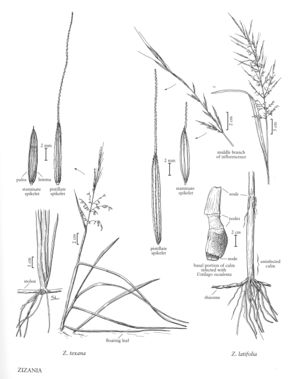Zizania latifolia
Plants perennial; rhizomatous. Culms 1-2.5(4) m, erect, rooting at the lower nodes, emergent. Sheaths glabrous, lower sheaths tessellate; ligules 10-15 mm, triangular; blades (30)50-100 cm long, 1-3.5 cm wide, abaxial surfaces smooth, adaxial surfaces scabrous. Panicles 30-50 cm long, 10-15 cm wide; branches unisexual or bisexual, lower branches with staminate spikelets, middle branches with staminate and pistillate spikelets, upper branches with pistillate spikelets. Staminate branches spreading; pedicel apices 0.2-0.5 mm wide. Staminate spikelets 8-12 mm, elliptic-oblong, margins ciliate, awned, awns 2-8 mm, scabrous; anthers 5-8 mm. Pistillate branches erect; pedicel apices 0.3-0.6 mm wide. Pistillate spikelets 15-25 mm, linear, veins scabrous, awned, awns 15-30 mm, scabrous. Caryopses about 1 cm. 2n = 30, 34.
Distribution
Pacific Islands (Hawaii)
Discussion
Zizania latifolia is native to Asia, extending from northeast India and Russia through China and Myanmar to Korea and Japan. In its native range, it grows in the shallow waters of lakes and swamps, forming large patches.
The rhizomes and basal parts of the culms of Z. latifolia are edible, and become swollen when infected with the fungus Ustilago esculenta Henn. The infection also prevents the plants from flowering and fruiting. If infected plants were introduced into North America, the fungus might also infect the native species of Zizania and likewise prevent their flowering (Terrell and Batra 1982), a possibility that should be strenuously resisted. Plants of Z. latifolia should not be brought into North America. Many states do not permit importation of plants of Z. latifolia from another state without examination by a state-approved plant pathology laboratory.
New Zealand has designated Z. latifolia a prohibited plant because it "displaces all species by its dense growth, blocks drainage and access to water, and increases the chance of flooding. It forms dense colonies in swampy areas, thus affecting productive farm land" (Environment Walkato 2002-2007).
Selected References
None.
